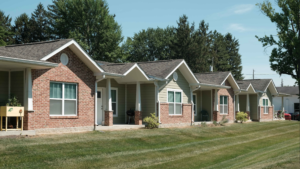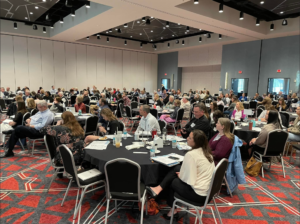Helping HAND
Hamilton County Area Neighborhood Development (HAND) Is Tackling Local Housing Needs
Writer / Julie Yates
Photography Provided
Hamilton County Area Neighborhood Development (HAND), Inc., a nonprofit organization, is dedicated to addressing the housing needs of low- and moderate-income individuals, families and senior citizens in the community. On May 4, the results of a Hamilton County housing study commissioned by the Hamilton County Housing Collaborative were presented to the public during HANDs 2022 Suburban Housing Conference. The study is important not only because of the statistics it reports, but also because it includes recommendations that involve immediate and long-range action at a time when funding is currently available.
 The study revealed that more housing of all kinds is needed from high to low end, says Andrea Davis, executive director of HAND. However, housing in Hamilton County is becoming less affordable to more people. The fastest-growing industries are the lowest paying. In 2019 the top five jobs that employed the most people in the county were fast food/counter workers, retail sales, customer service representatives, office clerks, and laborers/stocking/freight. None of these pay well. $16.60 an hour is the average. These incomes arent keeping pace with the increasing price in housing, which rose 63% from 2010 to 2019.
The study revealed that more housing of all kinds is needed from high to low end, says Andrea Davis, executive director of HAND. However, housing in Hamilton County is becoming less affordable to more people. The fastest-growing industries are the lowest paying. In 2019 the top five jobs that employed the most people in the county were fast food/counter workers, retail sales, customer service representatives, office clerks, and laborers/stocking/freight. None of these pay well. $16.60 an hour is the average. These incomes arent keeping pace with the increasing price in housing, which rose 63% from 2010 to 2019.
There is a stigma attached to affordable housing, such as people dont want to work or they are trying to get money from the government, Davis continues. In reality its different. People who need housing arent coming from outside the county. They already live here and they are working more than one job.
The study, which began in 2021 and was completed in January of 2022 by Greenstreet Ltd., indicated that a lack of appropriate housing for the entire workforce could jeopardize Hamilton Countys quality of life and economic health. If a section of the labor force is unable to afford living in the community, certain jobs could be unfilled, tax revenue could decrease and economic growth could be slowed. It could be harder to attract companies willing to invest in the community, in addition to people and jobs.
The county government has allocated $5 million towards helping to fund affordable housing, Davis says. Its time to make some long-term investing in developing some plans. We asked that the consultants take a look at other communities and see what they do, so the next time a study is done, we can see some improvement.
HAND already has a track record of developing affordable housing on a small scale. Stakeholders from multiple local organizations and nonprofits were in attendance at the packed May 4 conference. The study recommended that these groups, the public sector, development and builder communities, as well as realty companies, partner together. It recommended that the partnerships focus on four areas – reducing the cost of development, removing the cultural stigma attached to income-based housing, stabilizing and supporting individuals and families most at risk, and increasing funding for attainable housing.
We hope to see some improvement in the next 12 to 18 months, Davis says. Its a group effort. HAND cant fix these problems all by itself.
HAND, Inc. is located at 347 South 8th Street, Suite A in Noblesville. Call 317-674-8108 or visit handincorporated.org for more info.






